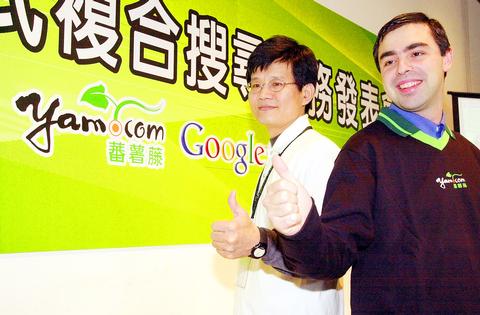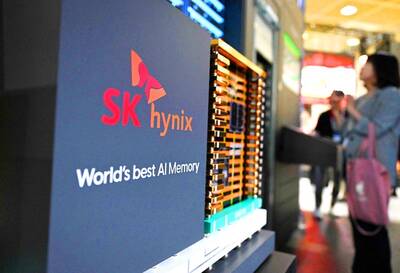Taiwan's second-largest Internet portal signed an alliance agreement with Google.com yesterday to provide technical support for further development of a Chinese-language search engine.
Yam.com signed the agreement yesterday with US search engine Google.com. After today, Google will provide its search engine services to Yam.com, and the two plan to work together in further developing the Chinese language aspects of the search engine.
"Google and other international companies realize the high value of integrating into Chinese-language portals," said Henry Su, multimedia and software analyst at Jih Sun Securities (

PHOTO: CHU PEI-HSIUNG, TAIPEI TIMES
Advertising revenues from the search engine will be shared between the two companies. Yam will find advertisers and collect fees in Taiwan, and pay out a lump sum to Google based on the two companies' agreement.
"This is our first agreement with a Taiwanese company and our first cooperation with a company [here] on the search engine," said Larry Page, CEO and co-founder of Google.
The agreement with Yam puts the Google search engine on Yam's portal site and into the hands of the firm's 1.3 million members. In return, Yam will help develop Google's Chinese-language search engine and implement its Chinese Web site filters -- the process by which a search engine lists the top results of a user's inquiry.
Google is the world's largest search engine, capturing 65 million page views per day on portals worldwide. The company's advertising revenues have increased quickly, according to company executives, because Google's software personalizes advertisements to the search, matching users' interests with specific products. It already operates in 25 different languages, including Chinese.
The dotcom alliance does not include any merger or other buyout possibilities such as were seen last month with the US$145 million deal between Yahoo and Kimo.
According to Hans Wachtel, president of Bertelsmann subsidiary Electronic Media Service, Yam has weathered the dotcom storm up to now by controlling costs and building revenues. Bertelsmann holds a 10 percent stake in Yam.
While Yam is preparing the paperwork for its public offering on the stock market, Wachtel said now is not the time for an IPO. Once investors return to dotcom stocks, then Yam will enter the market, he said.
"At the moment, [investors] are more careful than two years ago, more careful of what can happen in the dotcom industry," Wachtel said. "Valuations have come down to a very low level; some are too low at the moment. I hope we have seen the bottom."

Intel Corp chief executive officer Lip-Bu Tan (陳立武) is expected to meet with Taiwanese suppliers next month in conjunction with the opening of the Computex Taipei trade show, supply chain sources said on Monday. The visit, the first for Tan to Taiwan since assuming his new post last month, would be aimed at enhancing Intel’s ties with suppliers in Taiwan as he attempts to help turn around the struggling US chipmaker, the sources said. Tan is to hold a banquet to celebrate Intel’s 40-year presence in Taiwan before Computex opens on May 20 and invite dozens of Taiwanese suppliers to exchange views

Application-specific integrated circuit designer Faraday Technology Corp (智原) yesterday said that although revenue this quarter would decline 30 percent from last quarter, it retained its full-year forecast of revenue growth of 100 percent. The company attributed the quarterly drop to a slowdown in customers’ production of chips using Faraday’s advanced packaging technology. The company is still confident about its revenue growth this year, given its strong “design-win” — or the projects it won to help customers design their chips, Faraday president Steve Wang (王國雍) told an online earnings conference. “The design-win this year is better than we expected. We believe we will win

Power supply and electronic components maker Delta Electronics Inc (台達電) yesterday said it plans to ship its new 1 megawatt charging systems for electric trucks and buses in the first half of next year at the earliest. The new charging piles, which deliver up to 1 megawatt of charging power, are designed for heavy-duty electric vehicles, and support a maximum current of 1,500 amperes and output of 1,250 volts, Delta said in a news release. “If everything goes smoothly, we could begin shipping those new charging systems as early as in the first half of next year,” a company official said. The new

SK Hynix Inc warned of increased volatility in the second half of this year despite resilient demand for artificial intelligence (AI) memory chips from big tech providers, reflecting the uncertainty surrounding US tariffs. The company reported a better-than-projected 158 percent jump in March-quarter operating income, propelled in part by stockpiling ahead of US President Donald Trump’s tariffs. SK Hynix stuck with a forecast for a doubling in demand for the high-bandwidth memory (HBM) essential to Nvidia Corp’s AI accelerators, which in turn drive giant data centers built by the likes of Microsoft Corp and Amazon.com Inc. That SK Hynix is maintaining its